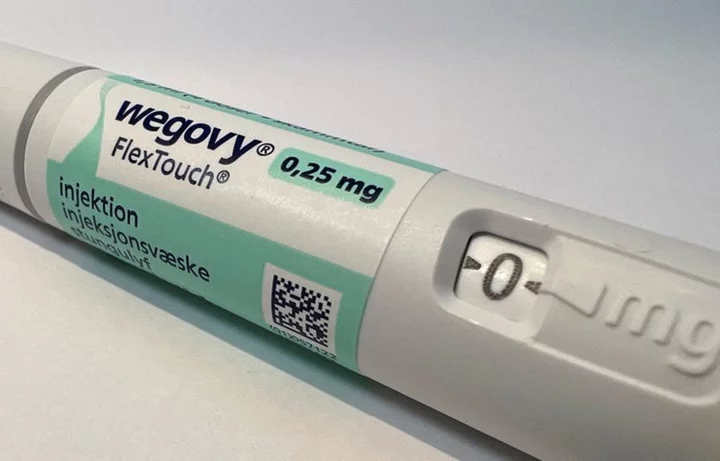By Julie Steenhuysen and Caroline Stauffer
CHICAGO A new class of weight loss drugs is transforming the U.S. healthcare system in ways that could extend to equally hard-to-treat areas like substance abuse, according to speakers at the Reuters Events Total Health conference in Chicago this week.
The U.S. Food and Drug Administration on Wednesday said Eli Lilly could begin selling its drug tirzepatide for weight loss, making it the second obesity drug in a class known as GLP-1s. The drug, Zepbound, is already sold under the brand name Mounjaro as a treatment for type 2 diabetes.
Novo Nordisk's Wegovy, or semaglutide, was approved for obesity in 2021 and is sold as Ozempic for diabetes.
Drugs in the class, which are also under development at a number of other pharmaceutical companies, are designed to mimic action of the GLP-1 hormone to regulate blood sugar, slow digestion and suppress appetite.
Studies of Novo's Wegovy showed that it led to 15% weight loss over 68 weeks, while Lilly's drug, which also targets a second hormone called GIP, demonstrated weight loss of more than 22% over 72 weeks.
"This opens up really some dramatic new opportunities in terms of control of the satiety region of the brain, but also other regions where addiction might be controlled," said Lawrence Tabak, principal deputy director at the U.S. National Institutes of Health (NIH), during an interview at Total Health on Wednesday.
He said NIH-supported studies are still "very much a work in progress," and the drugs can cause side effects, but "it does open up a whole new set of possibilities to control things like obesity, metabolism in general, perhaps other addictive conditions."
Drugstore chain Walgreens is seeing "enormous demand" for GLP-1s, said John Driscoll, president, U.S. healthcare at Walgreens Boots Alliance.
"I think these drugs are going to change the way people experience healthcare," he said, while noting that reimbursement by health insurers has not yet caught up with demand.
The drugs have U.S. list prices of more than $1,000 a month.
"As time progresses, you typically wind up with drugs that may cost less over time," the NIH's Tabak said.
He also said the potential for lower overall healthcare costs should be considered.
"If you are able to get a better control of obesity in this country, the savings on the back end due to reductions in cardiovascular disease, and then, you know, related conditions will be quite vast," Tabak said.
Much has been made of the impact the new weight loss drugs might have on consumer habits such as snack food purchases, but Driscoll said Walgreens has not seen that yet.
"If they do it's probably a good thing for U.S. health care and our population and we would happily adjust to what the consumers want to buy if that happens," he said. "I think we are just at the cusp of understanding beyond obesity."
(Reporting by Julie Steenhuuysen and Caroline Stauffer; Writing by Deena Beasley; Editing by Jamie Freed)

